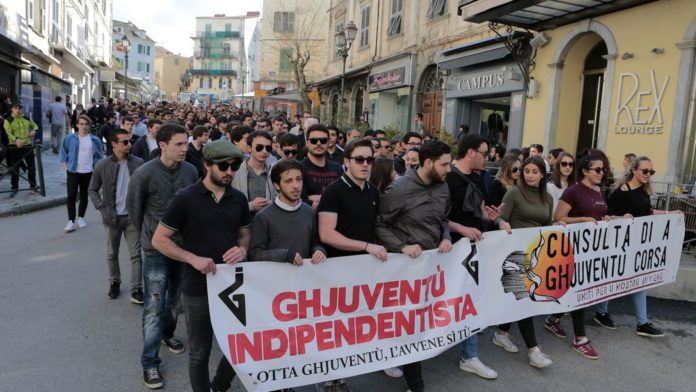Since 2010, Corsican nationalism has seen an important rise in elections, taking on a hegemonic position in the island’s present-day political arena. Long gone are François Mitterrand’s words during the 20th century 80s: “I will start to get concerned when Corsican nationalists get 15 % of the vote….”. Actually, Corsican nationalists showed little strength during that period, despite FLNC’s armed struggle being at its highest. In the 2017 Corsican election, the nationalist coalition Pe a Corsica won 56% of the vote, a landslide victory that earned them the control of the Corsican Assembly. Mitterrand would have no doubt much to fret about the present-day situation if he had seen it.
On the other hand, so far the electoral win has failed to crystallize in any political concessions from the French government. Corsican demands have fallen on deaf ears, running into a wall of French Jacobinism. French president Macron, who visited Corsica in 2018, was confronted first-hand with the main demands of native Corsican nationalist authorities, but he stood his Jacobin ground: “If the specificity demanded by the Corsicans means hostility towards the Republic I can only reject it”. Macron did not even show a token; his appearance in a Bastia venue with no Corsican flags along with the French was telling enough.
Historically, and presently, the main demands of the Corsican nationalists to Paris come down to the following:
1.- Increased self-government. A statute of autonomy, similar to the one held by the Catalans nowadays. At the moment they have shelved their historic demand for the right to self-determination on a political pragmatism basis. They are looking for a Corsican Assembly with legislative powers similar to those enjoyed by French colonial parliaments overseas. This pragmatic stance has been largely beneficial for Corsican nationalism, since they master full control on the Corsican Assembly.
2.- Official Corsican language, with the same legal status as French. In the last years, there has been some progress on language, but nothing near official status. For example, bilingual road signalling, or inclusion of Corsican language in education as a subject (French remains the vehicular language), etc. Overall, the sociolinguistic status of Corsican language remains healthy as compared to Breton, Occitan or Catalan, but attrition is apparent during last years. Despite absence of data, since France does not conduct any survey on “regional” languages, estimations indicate that 40% of the Corsicans can speak Corsican.
3.- Amnesty for FLNC prisoners (currently in French prisons) or at least their approach to Corsican prisons.
4.- A resident status: A third of all Corsican homes belong to French tourists. Many French with purchasing power enjoy a second home in Corsica, with many pensioners living there. The resident status would counter massive touristy pressure for the benefit of natives, since mass tourism overly increases prices to Corsicans. Protection of environment is also a historic demand.
Four years in office have not materialized in any gain from Paris for Corsican nationalists, and the demands above remain in place. Elections will be held again this year in Corsica, but the coalition Pe a Corsica (Femu a Corsica and Corsica Libera) has little outcomes to offer to their voters related to self-government. Would a new Corsican nationalist win push Paris to negotiation? How much is the French government willing to renounce in the face of the Corsican demands?
According to Catalan Ivan Serrano, Political Sciences professor and expert on Corsican matters at the Universitat Oberta de Catalunya, there is little prospect of Paris ever accommodating these historic demands. He has declared to NAZIOGINTZA that the chances of a French government ever accepting a Corsican Assembly with legislative powers are really slim. That Assembly enjoys administrative and executive attributions nowadays, but not legislative powers.
Serrano also remains pessimistic on language co-officialty. “France has always prioritized reason of state over democratic and cultural territorial rights. And Corsica is no exception”. “France has always been very effective in the imposition of its French national project, so he will not change that strategy”, he has noted. Accordingly, there is slim leeway for official status. In education, Corsican language may attain some more presence and obtain a status similar to that held in the Northern Basque Country, but a gulf separates that possibility from official status.
Agreements on prisoners and the resident status may be easier to achieve inasmuch as they do not collide directly with the French national project. Protection of environment, certain regulations for mass tourism, enhancing the natives’ living standards and so on are not on a collision course with French national sovereignty.
Hanging onto the political majority enjoyed now is the main challenge Corsican nationalism is facing in the upcoming election. It will attempt to showcase an image of efficient management, but it has little to deliver on cultural and national demands, given the rigid stance held by Paris. Will something move after the election?

